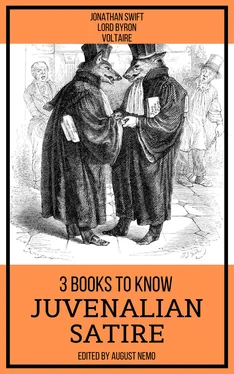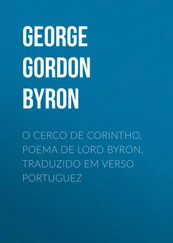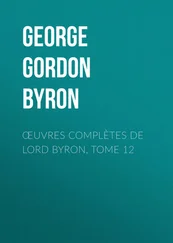1 ...7 8 9 11 12 13 ...32 Did not his countryman, Count Corniani,
Call me the only virtuous wife in Spain?
Were there not also Russians, English, many?
The Count Strongstroganoff I put in pain,
And Lord Mount Coffeehouse, the Irish peer,
Who kill'd himself for love (with wine) last year.
'Have I not had two bishops at my feet,
The Duke of Ichar, and Don Fernan Nunez?
And is it thus a faithful wife you treat?
I wonder in what quarter now the moon is:
I praise your vast forbearance not to beat
Me also, since the time so opportune is—
O, valiant man! with sword drawn and cock'd trigger,
Now, tell me, don't you cut a pretty figure?
'Was it for this you took your sudden journey.
Under pretence of business indispensable
With that sublime of rascals your attorney,
Whom I see standing there, and looking sensible
Of having play'd the fool? though both I spurn, he
Deserves the worst, his conduct 's less defensible,
Because, no doubt, 't was for his dirty fee,
And not from any love to you nor me.
'If he comes here to take a deposition,
By all means let the gentleman proceed;
You 've made the apartment in a fit condition:
There 's pen and ink for you, sir, when you need—
Let every thing be noted with precision,
I would not you for nothing should be fee'd—
But, as my maid 's undrest, pray turn your spies out.'
'Oh!' sobb'd Antonia, 'I could tear their eyes out.'
'There is the closet, there the toilet, there
The antechamber—search them under, over;
There is the sofa, there the great arm-chair,
The chimney—which would really hold a lover.
I wish to sleep, and beg you will take care
And make no further noise, till you discover
The secret cavern of this lurking treasure—
And when 't is found, let me, too, have that pleasure.
'And now, Hidalgo! now that you have thrown
Doubt upon me, confusion over all,
Pray have the courtesy to make it known
Who is the man you search for? how d' ye cal
Him? what 's his lineage? let him but be shown—
I hope he 's young and handsome—is he tall?
Tell me—and be assured, that since you stain
My honour thus, it shall not be in vain.
'At least, perhaps, he has not sixty years,
At that age he would be too old for slaughter,
Or for so young a husband's jealous fears
(Antonia! let me have a glass of water).
I am ashamed of having shed these tears,
They are unworthy of my father's daughter;
My mother dream'd not in my natal hour
That I should fall into a monster's power.
'Perhaps 't is of Antonia you are jealous,
You saw that she was sleeping by my side
When you broke in upon us with your fellows:
Look where you please—we 've nothing, sir, to hide;
Only another time, I trust, you 'll tell us,
Or for the sake of decency abide
A moment at the door, that we may be
Drest to receive so much good company.
'And now, sir, I have done, and say no more;
The little I have said may serve to show
The guileless heart in silence may grieve o'er
The wrongs to whose exposure it is slow:
I leave you to your conscience as before,
'T will one day ask you why you used me so?
God grant you feel not then the bitterest grief!-
Antonia! where 's my pocket-handkerchief?'
She ceased, and turn'd upon her pillow; pale
She lay, her dark eyes flashing through their tears,
Like skies that rain and lighten; as a veil,
Waved and o'ershading her wan cheek, appears
Her streaming hair; the black curls strive, but fail,
To hide the glossy shoulder, which uprears
Its snow through all;—her soft lips lie apart,
And louder than her breathing beats her heart.
The Senhor Don Alfonso stood confused;
Antonia bustled round the ransack'd room,
And, turning up her nose, with looks abused
Her master and his myrmidons, of whom
Not one, except the attorney, was amused;
He, like Achates, faithful to the tomb,
So there were quarrels, cared not for the cause,
Knowing they must be settled by the laws.
With prying snub-nose, and small eyes, he stood,
Following Antonia's motions here and there,
With much suspicion in his attitude;
For reputations he had little care;
So that a suit or action were made good,
Small pity had he for the young and fair,
And ne'er believed in negatives, till these
Were proved by competent false witnesses.
But Don Alfonso stood with downcast looks,
And, truth to say, he made a foolish figure;
When, after searching in five hundred nooks,
And treating a young wife with so much rigour,
He gain'd no point, except some self-rebukes,
Added to those his lady with such vigour
Had pour'd upon him for the last half-hour,
Quick, thick, and heavy—as a thunder-shower.
At first he tried to hammer an excuse,
To which the sole reply was tears and sobs,
And indications of hysterics, whose
Prologue is always certain throes, and throbs,
Gasps, and whatever else the owners choose:
Alfonso saw his wife, and thought of Job's;
He saw too, in perspective, her relations,
And then he tried to muster all his patience.
He stood in act to speak, or rather stammer,
But sage Antonia cut him short before
The anvil of his speech received the hammer,
With 'Pray, sir, leave the room, and say no more,
Or madam dies.'—Alfonso mutter'd, 'D—n her,'
But nothing else, the time of words was o'er;
He cast a rueful look or two, and did,
He knew not wherefore, that which he was bid.
With him retired his 'posse comitatus,'
The attorney last, who linger'd near the door
Reluctantly, still tarrying there as late as
Antonia let him—not a little sore
At this most strange and unexplain'd 'hiatus'
In Don Alfonso's facts, which just now wore
An awkward look; as he revolved the case,
The door was fasten'd in his legal face.
No sooner was it bolted, than—Oh shame!
O sin! Oh sorrow! and oh womankind!
How can you do such things and keep your fame,
Unless this world, and t' other too, be blind?
Nothing so dear as an unfilch'd good name!
But to proceed—for there is more behind:
With much heartfelt reluctance be it said,
Young Juan slipp'd half-smother'd, from the bed.
He had been hid—I don't pretend to say
How, nor can I indeed describe the where—
Young, slender, and pack'd easily, he lay,
No doubt, in little compass, round or square;
But pity him I neither must nor may
His suffocation by that pretty pair;
'T were better, sure, to die so, than be shut
With maudlin Clarence in his Malmsey butt.
And, secondly, I pity not, because
He had no business to commit a sin,
Forbid by heavenly, fined by human laws,
At least 't was rather early to begin;
But at sixteen the conscience rarely gnaws
So much as when we call our old debts in
At sixty years, and draw the accompts of evil,
And find a deuced balance with the devil.
Of his position I can give no notion:
'T is written in the Hebrew Chronicle,
How the physicians, leaving pill and potion,
Prescribed, by way of blister, a young belle,
When old King David's blood grew dull in motion,
And that the medicine answer'd very well;
Perhaps 't was in a different way applied,
For David lived, but Juan nearly died.
What 's to be done? Alfonso will be back
The moment he has sent his fools away.
Antonia's skill was put upon the rack,
But no device could be brought into play—
Читать дальше












